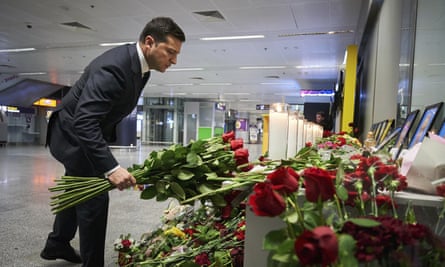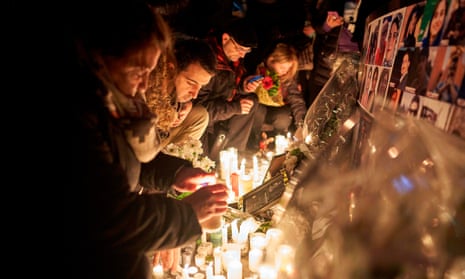Iran’s admission that it accidentally shot down a Ukrainian passenger plane has been met with international demands for a full investigation into the disaster, in which 176 people died during a period of soaring tensions between Tehran and Washington.
A statement on Iran’s official IRNA news agency on Saturday morning said the military had made an “unforgivable mistake” in targeting Ukraine International Airlines flight 752 shortly after it took off from Tehran’s international airport on Wednesday. It was followed by condolences from Iran’s supreme leader, Ayatollah Ali Khamenei, and an apology from the country’s president, Hassan Rouhani.
The Boeing 737 was hit by two surface-to-air missiles in the hours after Tehran launched ballistic missile strikes on US military bases in Iraq. The airliner was downed as a result of human error at a time when miltary forces were on high alert, the statement said.
Iranian officials had previously denied a missile strike was to blame, dismissing the allegations as western propaganda and blaming mechanical malfunction.
Saturday’s statement was greeted with some relief that the immediate cause of the disaster had been made clear, but Ukraine, Canada and other countries with citizens among the victims have since made fresh calls for further measures from Tehran.
The Ukrainian president, Volodymy Zelenskiy, said: “Even before the termination of the international commission, Iran has pleaded guilty to crashing the Ukrainian plane. But we insist on full admission of guilt. We expect from Iran assurances of readiness for full and open investigation, bringing those responsible to justice, returning the bodies of the dead, payment of compensation, official apologies through diplomatic channels.”
He later wrote on Facebook: “We expect Iran ... to bring the guilty to the courts,” , adding that he was scheduled to speak to Rouhani on Saturday afternoon.
The Canadian prime minister, Justin Trudeau, said his country’s focus was on “closure, accountability, transparency and justice” for the families of the 57 Canadian victims.
Iran has invited investigators from Canada, Ukraine and Boeing to visit the accident site on the outskirts of Tehran and said it would welcome representatives of other countries whose citizens had died.
Responsible parties would be held accountable, Iran’s military said, and its systems would be upgraded to prevent such mistakes in future.

Khamenei said he sent deep sympathy to the families of the victims and expressed a desire for a comprehensive investigation. He called on the armed forces to “pursue probable shortcomings and guilt in the painful incident”.
The acknowledgement of responsibility has renewed questions about why authorities did not shut down the country’s main international airport and its airspace after launching the missile attacks on Iraq when they feared US reprisals were possible.
The strikes on the two US bases on Iraqi soil were retaliation for the US drone strike that killed the powerful Quds force leader Qassem Suleimani in Baghdad on 3 January, the culmination of months of tit-for-tat attacks that recently threatened to push Washington and Tehran into war.
It also undermines the credibility of information provided by senior Iranian officials so far. As recently as Friday, Ali Abedzadeh, the head of the national aviation department, told reporters with certainty that a missile had not caused the crash. The cabinet spokesman, Ali Rabiei, dismissed reports of a missile on Thursday, saying they rubbed salt on a painful wound for families of the victims.
Air crash experts have raised serious concerns since the accident over the handling of the crash site, including the removal of debris, sparking fears that Tehran has sought to eliminate evidence from the area.
The passenger plane was mistaken for a hostile target after it turned toward a sensitive military centre, said General Amir Ali Hajizadeh, the head of the Revolutionary Guards aerospace division. His unit accepted full responsibility for downing the plane, he said. In an address broadcast by state TV, he said he wished he was dead when he learned about the accident.
He said the Revolutionary Guards had strengthened their air defences and were at the “highest level of readiness” for fear the US would retaliate. He said an officer made the “bad decision” to open fire on the plane after mistaking it for a cruise missile.
The public acknowledgement is likely to inflame public sentiment inside Iran against the authorities after citizens rallied around their leaders in the wake of Suleimani’s killing.
The vast majority of the passengers on the plane were Iranians or Iranian-Canadians, and the crash came a few weeks after a widespread crackdown on protests triggered by a rise in fuel prices.
The flight, which was bound for Ukrainian capital of Kyiv, was carrying 167 passengers and nine crew from several countries, including 82 Iranians, at least 57 Canadians, 11 Ukrainians and three Britons.
The semi-official Fars news agency reported that Khamenei had ordered top security officials to review the crash on Friday morning and announce the results.
“If some individuals, in any position, were aware of the issue but made statements contradicting the reality or hid the truth for any reason, they should be named and tried,” said Fars, which is close to the Revolutionary Guards.
Others speculated that the security forces may have concealed information from civilian authorities. “Concealing the truth from the administration is dreadful,” Mohammad Fazeli, a sociology professor in Tehran, wrote on social media.
“If it had not been concealed, the head of civil aviation and the government spokesmen would not have persistently denied it. Concealing the truth for three days is dangerous.”
